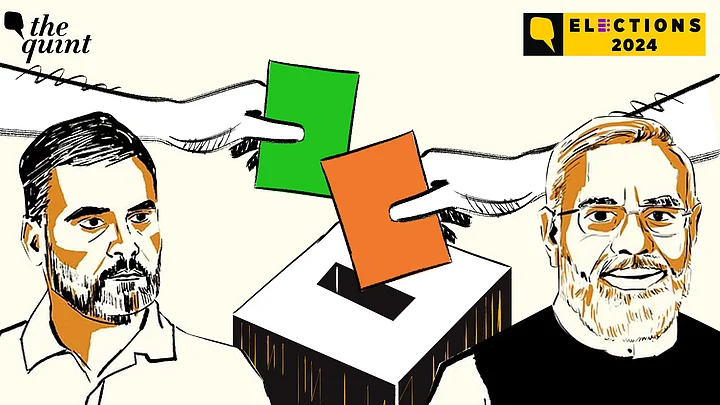The BJP-led NDA won a slender majority in the 2024 Lok Sabha elections and one of the biggest data points emerging from the post-poll analysis is that the ruling alliance doesn't have a single Lok Sabha MP from India's three biggest religious minorities - Muslims, Christians and Sikhs.
However, the voting preferences of religious minorities have undergone some changes compared to the 2019 Lok Sabha elections.
According to the data published by Lokniti-CSDS in The Hindu, the NDA has made major gains among Christians and incurred losses among Sikhs. In fact even after factoring in castes within Hindus, the NDA's biggest gains among any community were among Christians and biggest losses among Sikhs.
On the other hand, the Congress-led alliance has suffered significant losses among Christians.
Here's how vote preferences changed among different religious minorities.
NDA Gains Among Christians, Falls Among Sikhs
The most significant aspect is the rise in support for the NDA among Christians - from 16 percent to 28 percent, a gain of 12 percentage points. However, out of this the major gain has been for BJP's allies - 9 points. In all likelihood, this is due to the BJP's alliance with the Telugu Desam Party and Jana Sena Party in Andhra Pradesh.
The other significant figure is the NDA's steep fall among Sikh voters. According to the Lokniti-CSDS survey, the Sikhs' preference for the NDA fell from 31 percent in 2019 to just 10 percent in 2024, a massive fall of 21 percentage points. Much of this is due to the exit of the Shiromani Akali Dal from the NDA as 19 percentage point drop is from BJP allies. However, the fall in Sikhs' preference for BJP is also significant as the BJP tried hard to expand its base in Punjab in this election. Over 80 percent of the Sikh population in India resides in Punjab. BJP contested four times the number of seats it usually does in Punjab had an overall vote share increase of 9 percentage points in the state. But it seems that much of this was among Hindu voters.
For the past few elections, Sikhs preference for BJP has been low and it hit rock bottom during the 2020-21 farmers protest.
Allies Give Congress a Boost Among Muslims
According to the Lokniti-CSDS survey, Muslims' preference for the Congress increased from 33 percent in 2019 to 38 percent in 2024. However, the biggest gains were for the Congress' allies - from 12 percent in 2019 to 27 percent in 2024.
CSDS has given the caveat that this doesn't include those who express preference for TMC in West Bengal or Left in Kerala as these were not pre-poll alliances.
This would mean that the overall preference for the INDIA bloc among Muslims would have been even higher than the 65 percent projected for Congress and allies in the CSDS survey.
Since the TMC hasn't been factored in, the massive increase in Muslims' support for Congress allies may largely be due to the entry of the Samajwadi Party in the Congress-led alliance.
What should worry the Congress, however, is its decline among Christians, from 39 percent in 2019 to 25 percent in 2024.
Among Sikhs, Congress at 30 percent was way ahead of the BJP at 10 percent, but this was a decline of nine percentage points compared to 2019. Much of this may have gone to Aam Aadmi Party, Shiromani Akali Dal and smaller parties.
No Gain for BJP Among Muslim Women
There had been a lot of speculation in the media that BJP has made gains among Muslim women allegedly due to the ban on Triple Talaq. This is not supported by data as NDA's performance among Muslim women was even worse than among Muslim men.
According to the survey, 7 percent Muslim women said they voted for BJP and 2 percent said they voted for BJP allies. The overall figure among Muslims is 8 percent and 2 percent respectively. If the preference for BJP among Muslim women is 7 percent and overall preference for BJP among Muslims is eight percent, the figure among Muslim men is likely to me 9 percent.
Conversely, Congress did better among Muslim women than men.
40 percent Muslim women said they voted for Congress as opposed to 38 percent Muslims overall. This means that the figure among men would have been roughly 36 percent. Congress' allies on the other hand were more popular among men than women: 25 percent preference among Muslim women and 27 percent among Muslims overall indicating that among Muslim men preference for Congress' allies would have been 29 percent approximately.
Note: This story is focusing only on religious minorities. Lokniti-CSDS hasn't yet released a consolidated figure for the voter preference among Hindus and given it as different castes. We will focus on caste-wise vote preference in a separate story and we will update this story whenever CSDS releases the consolidate figure for Hindus' vote preference.
(At The Quint, we question everything. Play an active role in shaping our journalism by becoming a member today.)
